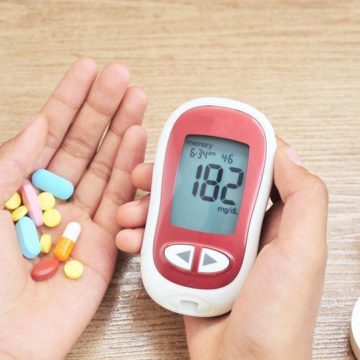
-
- People with type 2 diabetes sometimes opt for herbal supplements to help manage their blood sugar levels.
- Although studies are limited, some herbal treatments show promise as an alternative treatment for type 2 diabetes.
- See your doctor first before trying any supplements to make sure it doesn’t interfere with your other medications.
People with diabetes need to manage their condition through controlled blood sugar levels. When diet and exercise are not enough to regulate it, some people with type 2 diabetes turn to other less potent options like alternative medicine that can also treat other health problems aside from blood sugar control.
Although research is limited in this area, some herbal supplements have shown promise in reducing sugar levels, increasing insulin sensitivity, lowering high blood pressure and cholesterol, and more.
Here are 8 best herbal supplements for type 2 diabetes. But before trying any of these, consult with your doctor first because these can interfere with other medications.
Gymnema sylvestre

Normal dosage: 200 to 250 milligrams twice daily
This perennial plant’s Hindi name ‘gurmar’ which means ‘sugar destroyer’ is one of the most potent herbs for blood sugar control. According to a 2017 study in the journal Appetite that involved 51 healthy participants, those who drank tea containing Gymnema sylvestre were observed to have lesser appetites for sweet foods.
Bitter melon

Normal dosage: 50 to 100 milliliters or about 3 to 6 tablespoons of the juice daily
While a study published in the Journal of Ethnopharmacology found that bitter melon lowered fructosamine in people with type 2 diabetes, scientists in a 2017 study on mice indicated that raised blood glucose levels in type 1 diabetes can be decreased with an extract of bitter melon. Possible side effects may include gastrointestinal issues.
Magnesium

Typical dosage: 250 to 350 milligrams once a day
Magnesium deficiency can exacerbate raised blood sugar levels and insulin resistance. Evidence on whether magnesium supplements do lower blood sugar levels and promote insulin function remain inconclusive. Have your doctor check if you have a deficiency before taking magnesium supplements.
Prickly pear cactus

Typical dosage: If eaten as a food, aim for 1⁄2 cup of cooked cactus fruit a day. Otherwise, follow label directions.
Small studies including a 2017 animal study in the Evidence-based Complementary and Alternative Medicine has shown that the ripe fruit of this cactus can reduce blood sugar readings in diabetic rats. But results of animal studies aren’t always the same with human studies. Anyhow, this fruit can be found in grocery shops, or look for the juice or powder at health stores.
Chromium

Typical dosage: 200 micrograms once daily
Chromium deficiency commonly occurs among people with type 2 diabetes. While this supplement is believed to help with the disease, a 2016 reviewed research 2016 in the Oxford Academic Nutrition Reviews showed that conclusions are mixed with regards to its benefits.
Fenugreek

Typical dosage: Either 5 to 30 grams per meal or 15 to 90 grams with one meal each day
“Fenugreek is an herb that is thought to have a positive effect on metabolism and possibly blood pressure,” says Kellie Rodriguez, Global Diabetes Program director at Parkland Health & Hospital System in Dallas. Though studies are limited, the seed’s high fiber content may be responsible for these effects as well as its amino acid content which can increase insulin release.
Ginseng

Dosage: 1 to 3 grams a day in tablet form, or 3 to 5 milliliters of tincture thrice a day
This Chinese herb is highly beneficial for immunity and warding off diseases. Unlike other supplements, ginseng has been widely studied. Research from the University of Toronto has repeatedly shown that between ginseng capsules and placebo pills, ginseng capsules effectively decrease blood glucose in individuals with type 2 diabetes.
Alpha-lipoic acid (ALA)

Typical dosage: 600 to 800 milligrams a day
ALA supplements are shown by several studies to improve insulin resistance as well as nerve damage, which is a common and potentially serious complication of diabetes. Strong scientific evidence had also shown a reduction in nerve pain, numbness, and burning.
Source: The Healthy
